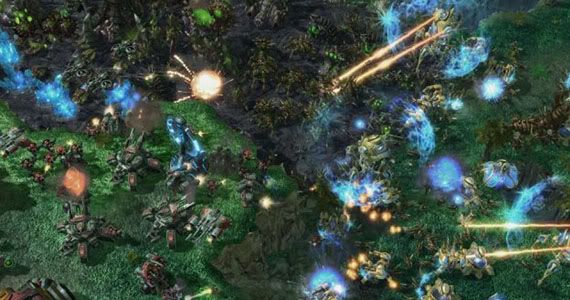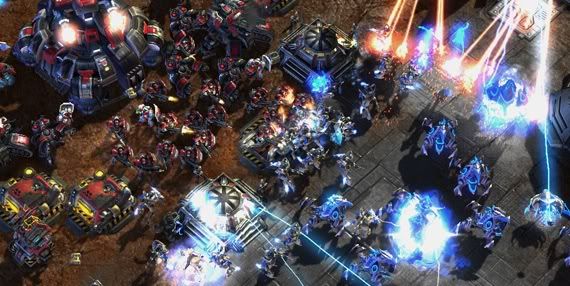
New players might pick up StarCraft II, developer Blizzard's 2010 update to their 1998 real-time strategy game StarCraft, expecting an experience that accomodates the uninitiated and provides a fun, semi-competitive atmosphere.
If thats what you are looking for, you should go somewhere else. StarCraft II is a game that is based purely on performance, and while the league ranking system works well to match players with opponents of equal skill, it all comes back to executing well.
If someone watches a Bronze League game and then goes and watches a match between two grandmaster players, he will notice the differences within seconds. The Bronze competitors will play in a very clunky and unorthodox manner. They will have macro (focus on expanding bases and producing large numbers of units) that is lacking, mouse control that is sub-par, and build orders that make no sense at all. The grandmaster players will have immaculate build orders timed to the second, almost unhuman mouse control, and macro that doesn's miss a beat. It would seem that these two groups of people have almost nothing in common, wouldn't it? That couldn't be farther from the truth.
While the two sets of players have very different levels of skill, all StarCraft II players seem to share a few similar traits. The same motives fuel almost anyone who sticks with StarCraft II for an extended period of time. These individuals are likely highly competitive, and they will not go into games to have fun while losing … they will go in with the intent of blocking out everything else around them with 100-percent focus on winning that specific match. As a player myself, it seems as if the world around you stops spinning, and all that matters is the clatter of the keys and clicks of your mouse.

Once the game ends, win or lose, players are expected to exit graciously with a "GG," signifying a "good game" played by both competitors. And unlike most other games, a StarCraft II match doesn't truly end immediately. Many players in any league will spend the next few minutes reviewing the battle, looking for mistakes they made, ways they can improve, and timings they can exploit. It's almost as if playing StaCraft II becomes an interactive classroom but where no one can ever learn everything.
The second trait shared by almost all StarCraft players is that all of them are always striving to reach a higher standing within the community. This is the trait that fuels the competitive spirit. Even the players at the top of the podiums, winning major events on a regular basis, are always trying to improve. Players such as Im_MVP or IM_Nestea spend 10 hours a day practicing in order to refine their game to an almost transcendent level of play. This is what many players grinding their way up the ladder are trying to achieve; they view these top performers as role models — something to strive toward.
Through the mixture of a shared competitive spirit and the development of a strong bond between players of all skill levels, the game builds a community that is not only helpful but generally polite. Almost anyone who plays StarCraft would tell you that at one point or another that they have both recieved help from another player and helped someone less skilled than themselves to improve.
This is not only common but expected. These are the traits that have bound this community so closely, and this is the reason that a game as competitive as StarCraft II — something that seems as if it would push players apart — has actually brought them closer together.
VentureBeat's mission is to be a digital town square for technical decision-makers to gain knowledge about transformative enterprise technology and transact. Learn More
